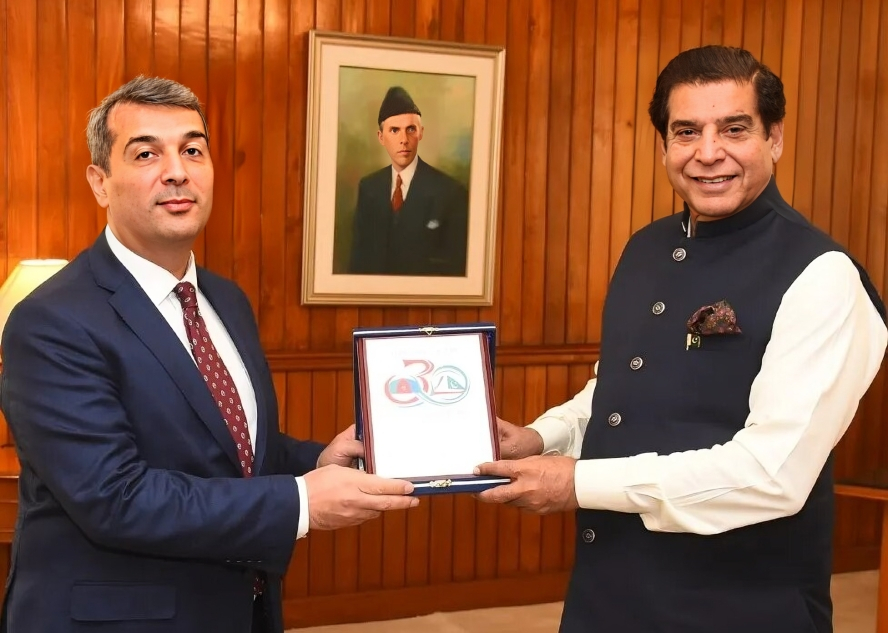The completion of thirty years of diplomatic and cooperative ties between Baku and Islamabad has marked a new chapter in the Pakistan-Azerbaijan bilateral foreign relations. The leaders of both states are actively engaged in arranging different social and political activities to recall the history of their cooperative engagements in different fields. The two diplomatic communities mainly focus on strengthening people-to-people contacts between their nations believing that the cooperative and active interaction could empower the political coordination between Baku and Islamabad. The quest for augmenting the existing levels of Pakistan-Azerbaijan social relations has led the political authorities of both states to construct strong social bonds consisting of multileveled people-to-people contacts. The initiation of social ties has mainly produced various extents of community engagements in the education and socio-cultural domains. Engaging the population at different levels has let the two governments explore the economic and political potential of their nations. Furthermore, the active and brief communication connections between Baku and Islamabad have resulted in various joint collaborations in the economic and political domains. Based on the persistently growing Pakistan-Azerbaijan cooperative ties, it can be maintained that the existing designs of two-sided cooperative bilateralism are directly linked to the strength of social cooperation between both nations. The increasing people-to-people contact between the two societies cannot be separated from the history of cooperative bilateralism between both states. A pleasant societal interaction is mainly supported by the active diplomatic and political coordination between Baku and Islamabad, which was initially started in the post-bipolar international environment.
The genesis of Pakistan-Azerbaijan ties can be traced back to the initial days of post-Cold War politics when the government of Azerbaijan declared its independent status in the international system and established an autonomous and sovereign government. The creation of a Soviet-less international system provided sufficient opportunities for Azerbaijan’s independent government to manage its foreign relations with the outside world. In response to the disintegration of the Soviet Union from the international system and Azerbaijan’s recognition as an independent and sovereign status in the world, the government of Pakistan immediately recognized Azerbaijan and decided to formulate close diplomatic connections with Baku. This cooperative beginning of the formal diplomatic ties let both the governments emphasize the diversification of their bilateral cooperative ties in different domains. The vision of diversifying the cooperative ties became a shared value between the two-sided leaders under different political administrations. The change of governments at the domestic level and the fluctuating attributes of great power politics at the international level remained ineffective in undermining and downgrading the bilateral cooperative framework between Baku and Islamabad. Despite having high ambition of creating several avenues of joint ventures in different domains, the mainstream pattern of Pakistan-Azerbaijan cooperation remained low at the political, economic, and social levels. These levels generally define the strength of bilateral cooperation between states, where the regional and domestic pressures are always considered significant hurdles in restricting the increasing levels of cooperation between different states. Therefore, an analytical survey of the three-decades-long cooperative bilateralism between Baku and Islamabad portrays an unsatisfactory picture in which the leaders of both states remained inefficient in achieving desired goals of their bilateral interaction. The desires on both sides for exploring new avenues of bilateral collaboration in diverse fields are marginalized due to the following reasons.
- The political coordination between Baku and Islamabad is supported by an active framework of diplomatic communication and cooperative social interaction. However, the combination of political and social dealings did not witness any critical or negative development from both sides. The absence of critical developments in the Pakistan-Azerbaijan relations marginally incentivized both nations’ governments to enhance their interstate cooperation. A brief history of reciprocal political visits and high-profile bilateral meetings emphasized the territorial conflicts of South Asian and South Caucasian regions, which are directly linked to Pakistan and Azerbaijan. Leading political authorities from Baku and Islamabad have always supported each other against territorial aggressions of neighboring states. Pakistan’s territorial dispute with India is analogous to Azerbaijan’s conflict with Armenia. These hostilities are generally considered the gravitational points of Baku-Islamabad’s interstate cooperation internationally. Thus, the leaderships from Baku and Islamabad heavily rely on acquiring political support on Kashmir and Karabagh’s issues without exploring other dimensions of the collaboration. It is therefore more appropriate to maintain that the leaderships proved inefficient in expanding their supportive ties beyond their specific territorial issues.

- The economic dimension of Baku-Islamabad bilateral cooperation witnessed a thin layer of collaboration in certain areas without achieving an appreciable level of import-export between them. The two governments are well-informed about each other’s trading potential due to the pleasant interaction of their societies, but the leading circles of two-sided business communities developed their communications in certain fields only. The main reason behind the limited trading exposure is linked to the performance of their respective governments in promoting country-specific business opportunities. Therefore, the present status of Pakistan-Azerbaijan trading collaboration results from the formal support of the two-sided governments without substantial legislative measures. Moreover, the lack of subsidized government policies for the promotion of trade in both states restricted the dealings of Pakistani-Azerbaijani business communities to in limited fields.
- The limited role of the business communities in specific domains is due to the lack of cultural exposure and inactive societal connections between Baku and Islamabad. The governments of Pakistan and Azerbaijan are working to augment the existing levels of their people-to-people contact by creating different tourist opportunities. However, the efforts are hampered by different societal challenges, such as the language barrier. Apart from ideological similarities based on Islamic values, the contrasting cultural values between Pakistani-Azerbaijani societies restrict the scope of close Baku-Islamabad societal connections. Thus, the inadequate cultural contacts hindered the chances of foreign direct investment between both states and restricted the trading and business opportunities in specific areas. The quest for constructing dynamic social collaboration has engaged the two-sided academic communities to an extent to improve the existing designs of their interstate cooperation. In contrast to the objectives of connecting the two-sided intellectual communities in different collaborative projects, the produced literature on the bilateral cooperation between Baku and Islamabad rarely identifies and emphasizes the role of potential and inevitable social factors that obstruct the scope of Pakistan-Azerbaijan cooperative bilateralism.
Based on the abovementioned, it can be maintained that the two governments are highly ambitious in achieving a great extent of bilateral relations between Baku and Islamabad. The celebrations of thirty years of collaboration in diverse fields proved that the leaders from both sides are trying to multiply the existing areas of cooperation with the help of strong people-to-people contacts. The two governments are also using their formal social media accounts to increase political and diplomatic communications with each other, in which the Azerbaijani state officials are well-motivated to initiate strategic interaction with their Pakistani counterparts. The formal social media message of thirty years celebration also communicated to the international community Baku’s intentions for achieving substantial progress in the strategic domain with Islamabad. The common concerns on the issues of terrorism, extremism, and sectarianism are the supporting elements that could empower the leaders in the strategic domain. Furthermore, the extension of cooperative foundations of bilateral relations could be improved with the help of advanced ties in the fields of education and tourism. The combination of both dimensions of cooperative ties will provide a supportive ground for understanding the societal attributes of each other. Moreover, the extension of conventional patterns of bilateralism will improve the standings of both states in global affairs, which will be a supportive factor for Pakistan and Azerbaijan in their regional affairs. In this way, a serious and pragmatic attention of the two leaders for strengthening of their existing framework of cooperative bilateralism is the prerequisite for securing the high extents of multidimensional cooperation between both states. Further upgrades in Pakistan-Azerbaijan relations can be ensured by the governments with the help of a critical approach. Adopting a critical approach against the potential challenges will empower the two-sided state officials to manage their conventional disconnects in the political, economic, and social domains.





